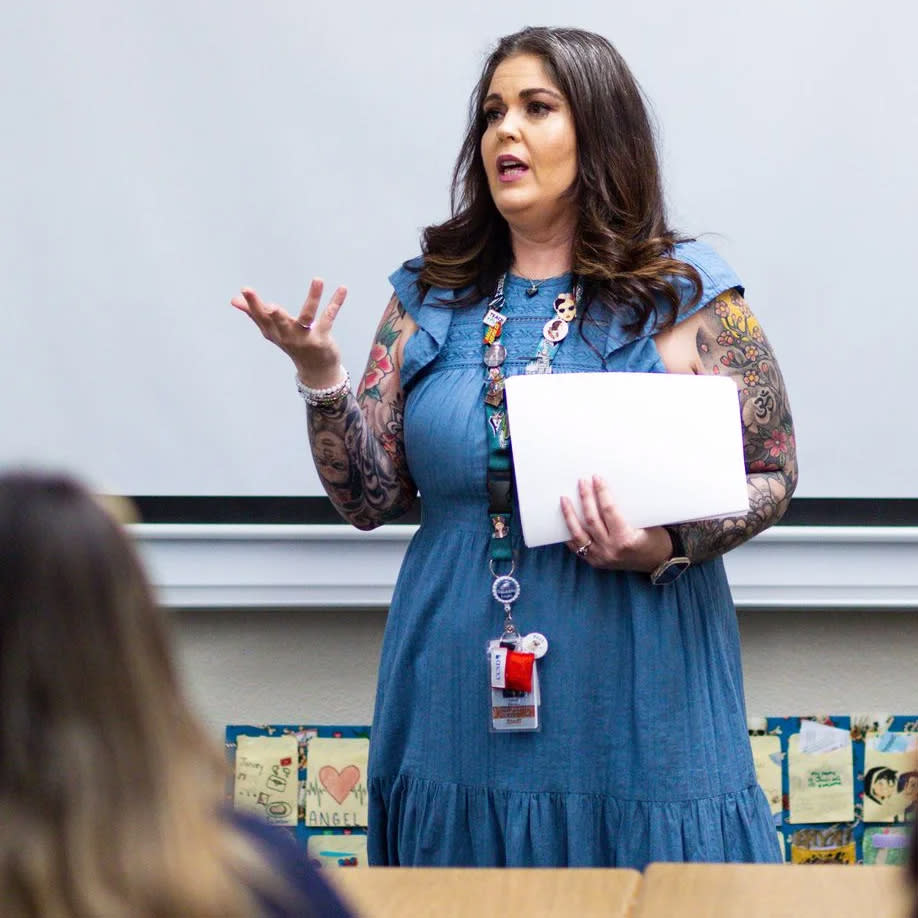Artificial Intelligence & Schools: Innovators, Teachers Talk AI’s Impact at SXSW

- Oops!Something went wrong.Please try again later.
South by Southwest Edu returns to Austin, Texas, running March 3-7. As always, the event offers a wealth of panels, discussions, film screenings and workshops exploring emerging trends in education and innovation.
Keynote speakers this year include Geoffrey Canada of Harlem Children’s Zone, Carol Dweck of Stanford University, who popularized the idea of “growth mindset,” and actor Christopher Jackson, who starred on Broadway as George Washington in Hamilton. Jackson, who has a child on the autism spectrum, will discuss how doctors, parents and advocates are working together to change the ways neurodivergent kids communicate and learn.
But one issue that looms larger than most in the imaginations of educators is artificial intelligence. This year, South by Southwest EDU is offering dozens of sessions exploring AI’s potential and pitfalls. To help guide the way, we’ve scoured the schedule to highlight 18 of the most significant presenters, topics and panels:
Monday, March 4:
11:30 a.m. — The Creative Frontier: AI & the Making of Immersive Reality: The New School’s Maya Georgieva looks at how AI is ushering in a new era of immersive experiences. Her talk explores worlds that blur the lines between the virtual and real, where human ingenuity converges with intelligent machines. Georgieva will spotlight the next generation of creators shaping immersive realities, sharing emerging practices and projects from her students as well as her innovation labs and design jams. Learn more.
1 p.m. — The Future of Assessment is Invisible: Educators have long sought a better way to demonstrate learning, adapt instruction and build student confidence. Now, advancements in machine learning, natural language processing and data analytics are creating new possibilities for finding out what students know. This session will explore the ways in which AI is rendering assessments invisible, reducing stress and anxiety for students while improving objectivity and generating actionable insights for educators. Learn more.
School Boards Face Their Most Difficult Budget Season Ever. Many Are Unprepared
1 p.m. — How AI Can Help Teachers Simulate Success: Many high-pressure professions — pilots, doctors and professional athletes among others — have access to high-quality simulators to help them learn and improve their skills. Could teachers benefit from hours in a simulator before setting foot in a classroom? In this session featuring presenters from the Relay Graduate School of Education and Wharton Interactive at the University of Pennsylvania, panelists will discuss virtual classrooms they’re piloting. They’ll also address the challenges, successes and possibilities of developing an AI-driven teaching simulator. Learn more.
2:30 p.m. — An Investor Talk on AI: All-In or All-Hype: In just the first half of 2023, venture capital investors poured more than $40 billion into AI startups. Yet big questions loom about how these technologies may impact education and the world of work. How are education and workforce investors separating wheat from chaff? Hear from a trio of venture capital and impact investors as they share the trends they’re watching. Learn more.
3:30 p.m. — AI & the Future of Learning: This session will look at the profound transformations in teaching taking place in classrooms that blend AI with tailored, competency-focused education. Laura Jeanne Penrod of Southwest Career and Technical Academy and Nevada’s 2024 Teacher of the Year will explore AI’s role in enhancing rather than supplanting quality teaching — and what happens when schools embrace the human touch and educators’ emotional intelligence. Learn more.

3:30 p.m. — Generative AI in Class: Female Leadership Perspectives: In this interactive workshop led by women leaders from the University of Texas at Austin and the Waco (Texas) Independent School District, participants will learn how to design effective lesson plans and syllabi that incorporate AI tools such as ChatGPT and DALL-E to help prepare students to address society’s most pressing needs. Learn more.
4:00 p.m. — Creativity Is the Durable Skill That AI Can’t Replace: If we get AI in education right, it has the power to revolutionize how children learn. But if we get it wrong and fail to nourish children’s creativity — their ability to innovate, think critically and problem solve — we risk leaving them unprepared for a changing world. Creativity is the durable skill that AI cannot replace. And this panel, comprising educators and industry leaders, will explore the role we play in nurturing children’s innate creativity. Learn more.
4:00 p.m. — Generative AI in Education: Learn from the Pioneers: This panel, featuring early AI-in-education pioneers such as Amanda Bickerstaff, founder of AI for Education, Charles Foster, an AI researcher at Finetune Learning, and Ben Kornell, co-founder of Edtech Insiders, will explore their journeys and what they consider the most exciting future opportunities — and important challenges — in this emerging space. Learn More.
New AI Tool to Help Parents Search, Compare Student Test Scores Across 50 States
Tuesday, March 5:
11:30 a.m. — AI’s Impact on Students of Color: Rethinking Digital Wellness: AI’s continued adoption in schools raises concerns about bias, especially toward students of color. This session, hosted by Common Sense Education’s Jamie Nunez, will highlight practical ways AI tools impact engagement for students from diverse racial and ethnic backgrounds. It will also address ethical concerns such as plagiarism and issues with facial recognition tools. And it will feature positive student experiences with AI and practical ways to ensure it remains inclusive. Learn more.

11:30 a.m. — AI Literacy for Educators: What It Is & How to Promote It: In 2024, what defines “AI literacy”? And how can we promote it effectively in schools? Marc Cicchino, innovation director for the Northern Valley Regional High School District in northeastern New Jersey, shares insights on fostering AI literacy through tailored learning experiences and initiatives like the NJ AI Literacy Summit. As part of the session, Cicchino guides attendees through organizing their own summit. Learn more.
11:30 a.m. — The Cusp, a Work Shift Podcast: Leveraging AI to Benefit Learners & Workers: Come watch a live recording of The Cusp, a new podcast hosted by Work Shift’s Paul Fain, exploring AI’s potential to not only enhance how we develop skills and improve job quality but exacerbate inequalities in our education and workforce systems. Leaders from Learning Collider, MDRC and Burning Glass Institute will share their perspectives on how AI can reach learners and workers in innovative ways, bridging the gap to economic opportunity. Learn more.
2:30 p.m. — TeachAI: Empowering Educators to Teach with AI & About AI: While a few school districts have embraced artificial intelligence, neither the technology companies creating the AI nor the governments regulating it have provided guidance on how to integrate the new tech into classrooms. This has left districts wondering how to integrate AI safely, ethically and equitably. This panel of TeachAI.org founders and advisory members will discuss why government and education leaders must align standards with the needs of an increasingly AI-driven world. The panel features Khan Academy’s Kristen DiCerbo, Kara McWilliams of ETS, Hadi Partovi of Code.org and ISTE’s Joseph South. Learn more.
Wednesday, March 6:
11:30 a.m. — ChatECE: How AI Could Aid the Early Educator Workforce: Just as artificial intelligence is gaining momentum in education, the early childhood education workforce is experiencing record levels of burnout. A recent survey found many educators say they’re more likely to remain in their roles if they have access to better support, including high-quality classroom tools and flexible professional development. Could we harness AI to empower our early childhood workforce? This panel, led by the National Association for the Education of Young Children’s Michelle Kang and Isabelle Hau of the Stanford Accelerator for Learning, will explore the possibilities and challenges of AI in early childhood education. Learn more.
1 p.m. — Tomorrow’s Principal Podcast: Will AI Be Your Next Principal? Perhaps no one in education needs to adapt more to AI than principals. This discussion with a principal and consultants from IDEO, The Leadership Academy and the Aspen Institute will explore how principals can lead during this time of swift change. Participants will come away with tangible suggestions for fostering innovation, adaptability and self-awareness. Learn more.
School Boards Face Their Most Difficult Budget Season Ever. Many Are Unprepared
3:30 p.m. — Yes, You CAN Build with AI Too: This interactive session will give educators an opportunity to explore how they might use AI to advance their work, regardless of their background or technical expertise. Led by project managers and leadership development specialists with Teach For America, it will help participants create their own AI tools, build a deeper understanding of generative AI and develop a better sense of its promises and risks. Learn more.
Thursday, March 7:
10 a.m. — AI: Avoiding the Next Digital Divide: This panel discussion, led by The Education Trust’s Dia Bryant and Khan Academy’s Kristen DiCerbo, will look at whether emerging uses of AI in schools could create a new digital divide. It will explore the intersection of AI and education equity and AI’s impact on students of color, as well as those from low-income backgrounds. The session will offer steps that educators and policymakers can take to ensure that schools factor in the culture and neurodiversity of students. Learn more.

11 a.m. — Building the Next Gen of Black AI Leaders: This session, led by Alex Tsado of Alliance4ai, will explore what’s required to engage diverse learners to become emerging AI leaders. It’ll also explore how educators can help them build tech and leadership skills and promote an “AI-for-good” worldview. And it’ll examine the challenges that Black communities face in AI development — and propose research and solutions that can be scaled easily. Learn more.
11:30 a.m. — Meaningful & Safe AI: Policy & Research Perspectives: This panel brings together Kristina Ishmael of the U.S. Department of Education’s Office of Educational Technology and Jeremy Roschelle of Digital Promise for an interactive conversation about generative AI that will integrate two distinctive and powerful vantage points — policy and research. They’ll reflect on the listening sessions they’ve conducted, talk about policy and share insights from major research initiatives that address the efficacy, equity and ethics of generative AI. Learn more.

